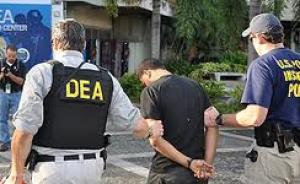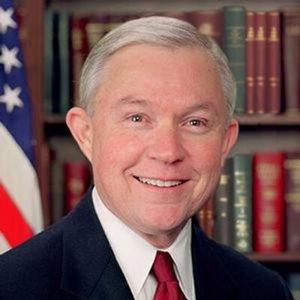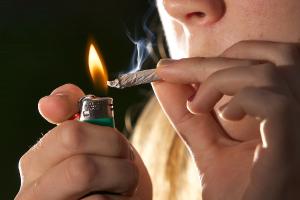This article was produced in collaboration with AlterNet and first appeared here.f
Despite spreading marijuana legalization and despite a growing desire for new directions in drug policy, the war on drugs continues unabated. According to the FBI's latest Uniform Crime Report, released Monday, overall drug arrests actually increased last year to 1.57 million, a jump of 5.63% over 2015. The increase includes marijuana arrests, which jumped by more than 75,000 last year compared to 2015, an increase of 12%.

The war on drugs rolls on. (Wikimedia)
That comes out to three drugs arrests every minute, day in and day out, throughout 2016. It's also more than three times the number of people arrested for violent crimes. Drug offenses are the single largest category of crimes for which people were arrested last year, more than burglaries, DUIs, or any other criminal offense.
Unlike previous years, this year's Uniform Crime Report did not immediately make available data on specific offenses, such as drug possession or drug sales, nor did it break arrests down by type of drug, but the Marijuana Policy Project obtained marijuana arrest data by contacting the FBI. It reported some 653,000 people arrested on marijuana charges last year, although the FBI did not provide data on how many were simple possession charges.
While that figure marks a decline from historic highs a decade ago -- pot arrests peaked at nearly 800,000 in 2007 -- the sharp jump in pot arrests last year demands explanation, especially as it comes after a decade of near continuous declining numbers.
"Arresting and citing nearly half a million people a year for a substance that is objectively safer than alcohol is a travesty," said MPP communications director Morgan Fox. "Despite a steady shift in public opinion away from marijuana prohibition, and the growing number of states that are regulating marijuana like alcohol, marijuana consumers continue to be treated like criminals throughout the country. This is a shameful waste of resources and can create lifelong consequences for the people arrested."

While the majority of drug (and other) arrests are conducted by local law enforcement, DEA helps, too. (justice.gov)
Despite the lack of specific offense data, 2016 is unlikely to turn out markedly different from previous years when it comes to the mix of drug arrests. Past years typically had simple drug possession offenses accounting for 85% to 90% of all drug arrests and small-time marijuana possession arrests accounting for around 40%.
That means that of the more than 1.5 million drug arrests last year, probably 1.3 million or so of them were not drug kingpins, major dealers, gangbangers, or cartel operatives. Instead they were people who got caught with small amounts of drugs for personal use.
"Criminalizing drug use has devastated families across the US, particularly in communities of color, and for no good reason," said Maria McFarland Sánchez Moreno, executive director of the Drug Policy Alliance. "Far from helping people who are struggling with addiction, the threat of arrest often keeps them from accessing health services and increases the risk of overdose or other harms."
Perpetuating the war on drugs leads not only to the criminalization of millions, but also perpetuates racially biased outcomes and heightens racial tensions in the US. Black people make up just 13% of the U.S. population and use drugs at similar rates to other ethnic groups, but they constitute 29% of all drug arrests and 35% of state drug war prisoners.
And it has a huge negative impact on immigrants, fueling mass detentions and deportations. Non-citizens, including legal permanent residents -- some of whom have been here for decades and have US citizen family members -- face deportation for even possessing any drug (except first-time possession of less than 30 grams of marijuana). Between 2007 and 2012, more than a quarter million people were deported for drug offenses, including more than 100,000 deported for simple drug possession.
Last year, the Obama administration was in power and setting the tone on drug policy and criminal justice matters -- and the number of arrests still went up. These disappointing numbers show that reformers have their work cut out for them all the more with the "tough on crime" Trump administration in power for at least the next few years.
back to top
This article was produced in collaboration with AlterNet and first appeared here.
Faced with an ever tougher economic sanction regime aimed at forcing the Hermit Kingdom to end its nuclear and ICBM programs, there are increasing signs that North Korea is using drug dealing -- among other illicit activities -- to earn hard currency. Such moves call into question whether economic sanctions can cause enough pain to the regime to force it to modify its behavior since the country's illicit economy is estimated to be larger than its licit one.

North Korean leader Kim Jung Un (Flickr)
At a deeper level, they also shed light on one of the unintended consequences of drug prohibition. Criminalizing the drug trade means there are huge profits waiting for those willing to scoff at the drug laws, as North Korea has done for decades.
According to Deutsche Welle, which cites South Korean sources with covert contributors in the north, state-run trading companies have begun to manufacture and sell illicit drugs in a move to bust the sanctions regime. The companies have been "ordered to earn foreign currency" and, with legal means of doing so being constrained by United Nations export bans, they "are turning to drugs manufacturing on an industrial scale."
It wouldn't be the first time. The Kim dynasty ordered the production of opium poppies in the 1970s, with the harvest "sent to pharmaceutical plants" where it was "processed and refined into heroin… under the direct control and strict supervision of the central government," regime defectors reported. Drugs would be smuggled across the Yalu River into China, on commercial shipping bound for loosely guarded Southeast Asian ports, and inside the baggage of North Korean diplomats.
After 1998, as famine lingered and torrential rains ruined poppy fields, King Il Sung engineered a switchover of heroin labs to methamphetamine labs. Meth suited the regime both for domestic purposes -- it stimulated workers' energy while reducing their hunger -- and for its ability to generate hard currency.
Within a few short years, the value of North Korean drug production exploded, with the US-China Economic and Security Review Commission estimating that the country earned between $500 million and $1 billion from the drug trade in 2001 alone. A Congressional Research Service report seven years later concurred, also estimating the value of the trade at up to a billion dollars. By 2005, the Chinese were complaining about intercepted shipments of methamphetamine and MDMA being trafficked from North Korea.
Little has changed in the intervening years. North Korean meth is still making its way to China, according to journalist Brendan Hong.
"China has a major meth problem," he wrote last year. "It mostly comes from North Korea and it's been flooding northeastern China for years. I have seen workers abuse meth in Chinese electronics factories so they can stay awake when trudging through unending shifts. Cam girls (models who perform or strip online for a fee) and karaoke hostesses smoke it with their clients, who call the practice, "ice-skating.'"
"The North has a long track record of manufacturing and selling drugs overseas and it is a convenient fallback for the regime to ratchet up production when sanctions are stepped up and it is harder for them to export legitimate goods," said Stephen Nagy, a senior associate professor of international relations at Tokyo's International Christian University. "It is clear that they need hard cash for their new military gadgets and they know there is a big cash market for illegal drugs," he told Deutsche Welle.
North Korea appears bound and determined to become a nuclear state complete with the means to deliver atomic death and destruction across thousands of miles. And if it's got an illicit drug industry as big as its legal economy, sanctions aimed at legal sectors of the economy aren't going to rein in the regime. The primary result of increased sanctions may turn out to be making Kim Jung Un the Walter White of Northeast Asia.
back to top
The 2017 International Drug Policy Reform Conference will convene in Atlanta, Georgia on October 11-14. More than 1,500 people who believe the war on drugs has failed will be in attendance to network, to strategize and to lift up policies grounded in science, compassion, health and human rights.
Attendees will join a broad range of drug policy stakeholders -- activists, academics, healthcare and public health advocates, veterans, formerly incarcerated people, elected officials, students, and many others from around the country and across the globe!

vigil at 2009 DPA conference, Albuquerque
This year, attendees will have the opportunity to spend three days deepening connections with people committed to finding alternatives to the war on drugs while participating in sessions facilitated by leading experts.
Visit http://www.reformconference.org to register. Get updates on the Reform Conference on Facebook and Twitter, and follow hashtag #NoMoreDrugWar.
The reduced rate we announced for Atlanta-area residents is good through this Tuesday, October 3rd. Email asha bandele for information, and if you already have the discount code but haven't registered yet, please do so by Tuesday.
back to top
This article was produced in collaboration with AlterNet and first appeared here.
Marijuana legalization is not the cause of increased marijuana use nationwide, a new study finds. Instead it's the other way around: Marijuana legalization reflects increased acceptance of marijuana.
In the
study, published this month in the journal
Addiction, researchers from the Public Health Institute's Alcohol Research Group examined 30 years' worth of data from National Alcohol Surveys, which also include questions on marijuana use, and compared that data to changes in state laws.
What they found is not that pot policy drives behavior, but vice versa.
"Medical and recreational marijuana policies did not have any significant association with increased marijuana use," the authors concluded. "Marijuana policy liberalization over the past 20 years has certainly been associated with increased marijuana use; however, policy changes appear to have occurred in response to changing attitudes within states and to have effects on attitudes and behaviors more generally in the US."
Increasing marijuana use is "primarily explained by period effects," or social factors that impact populations across age and generational groups, and not by policy changes, the authors insist.
"The steep rise in marijuana use in the United States since 2005 occurred across the population and is attributable to general period effects not specifically linked to the liberalization of marijuana policies in some states," the paper concluded.
Those effects could include declining disapproval of marijuana among the overall population caused by increasing familiarity with the plant, as well as a tendency in surveys from earlier years for respondents to understate their actual marijuana usage.
The notion that policy does not drive drug use levels is not new. Academic researchers Peter Cohen and Craig Reinarman reported similar findings back in 2004. But the implications of such research are important: If drug policy has little impact on drug use levels, why have punitive drug policies?
back to top
Voters in Maine narrowly approved marijuana legalization last November, and since then, the state legislature has been busily trying to come up with rules and regulations for the legal weed market. Now, they are envisioning something of a rarity: allowing customers to buy their weed at drive-up windows.
Of the five states that currently allow legal adult marijuana sales -- Alaska, Colorado, Nevada, Oregon, and Washington -- only Oregon and Colorado allow for drive-through sales. California, where sales are set to begin January 1, had drive-through sales written into draft regulations, but those proposed regs have had to be pulled and rewritten to comply with a state law merging the recreational and medical markets. Still, drive-through sales may survive the regulatory process there. Massachusetts hasn't directly addressed the issue, leaving it up to its Cannabis Control Commission to figure out before the state begins sales next summer.
For a measure whose mantra was "treat marijuana like alcohol," allowing drive-through pot sales seems like a no-brainer.
"If Maine allows it for alcohol, we see no reason why it shouldn't be allowed for marijuana, the safer substance, so long as Maine puts in place reasonable regulations to protect public safety and the consumer," David Boyer, director of the Maine chapter of the Marijuana Policy Project told the Portland Press Herald. "The voters want it regulated and taxed like alcohol. The rules should be the same."
But it's not a done deal yet. The legislature's Joint Select Committee on Marijuana Legalization Implementation is still considering the draft bill, and the coming week will be crucial. The bill gets a public hearing Tuesday and legislative debate is set for Wednesday and Thursday. If the committee approves it, it goes before the full legislature next month.
Drive-through sales is one of a subset of non-storefront sales possibilities facing legal pot regulators. Sales by delivery services and online sales are additional bones of contention. The proposed Maine legislation would allow both of those, too, but not all the other legal states do.
It is a sign of significant progress, or course, that the debate has shifted from how hard to punish pot smokers and dealers to how best to accommodate and regulate legal marijuana. But legal marijuana still has a ways to go before we can say it is treated like alcohol.
back to top
It was a pretty quiet week on the medical marijuana front, with all the action taking place in the courts. A Florida farmer sues over grower licenses, a Montana dispensary operator sues over a local ban, and more.
FloridaLast Friday, the state's medical marijuana law was challenged by a black farmer. A state law designed to ensure that at least one medical marijuana cultivation license is reserved for a black farmer has been challenged by a black farmer. Panama City farmer Columbus Smith filed suit to challenge the law, arguing that it is so narrowly drawn that only a handful of black farmers in the state could qualify. The lawsuit names as a defendant the state Department of Health, which issues licenses, and seeks a temporary injunction blocking the issuance of licenses under that provision of the law.
Kentucky
Last Wednesday, a court dismissed a lawsuit aimed at the governor and attorney general. A lawsuit filed against Gov. Matt Bevin (R) and Attorney General Andy Beshear (D) seeking to force them to legalize medical marijuana in the state was thrown out. A Franklin circuit court judge ruled that legal precedent makes it clear that only the legislature can regulate the use of marijuana in the state -- not the executive branch and not the courts.
Montana
Last Friday, a Billings dispensary owner won a temporary restraining order to block a local ban. Richard Abromeit, the co-owner of Montana Advanced Caregivers in Billings, and a patient filed a temporary restraining order against the city in a bid to block city officials from enforcing its new ordinance banning medical marijuana businesses. Now, the city cannot enforce the ban until a future court hearing decides the issue. The dispensary has operated in Billings for a decade, but city fathers voted last month to approve an ordinance that bans all medical marijuana businesses.
[For extensive information about the medical marijuana debate, presented in a neutral format, visit MedicalMarijuana.ProCon.org.]
back to top
Busy, busy: A long-time fugitive rogue Chicago cop gets cop, a DHS agent gets nailed for taking big bucks to help a Cali Cartel operative make an indictment go away, a Vermont cop plied a woman addict with drugs in order to get laid, and more. Let's get to it:
In Detroit,
a former Chicago police officer on the lam for 14 years was arrested last Tuesday. Former Chicago PD Sgt. Eddie Hicks, 68, had fled on the eve of his drug conspiracy trial in 2003. He had been charged in 2001 with running a crew of rogue officers who robbed drug dealers, stole their cash and sold their drugs to other dealers. While a fugitive, Hicks conducted financial transactions designed to benefit family members, including signing over a property used to secure his $150,000 bail to his son, also a Chicago police officer. Additionally, some $300,000 in police pension payments went to his bank account or were cashed by his wife.
In Louisville, Kentucky, a former Bullitt County Sheriff's Office chief deputy was indicted last Wednesday for stealing drugs from the department evidence room. John Cottrell allegedly took marijuana, hydrocodone, and other pills, and investigators found some of the drugs in his office. Cottrell claims he is the victim of a vendetta by department supporters of former Sheriff David Greenwell, who himself has been indicted on drug charges. Cottrell faces charges of theft of a legend drug, abuse of public trust, and evidence tampering.
In Burlington, Vermont, a form Royalton police officer was arrested last Thursday on charges he stole heroin from the evidence room and gave it to an addict with whom he was having a sexual relationship. John Breault provided heroin and other drugs to the woman, who was described as a confidential informant, before she eventually reported him to the DEA. She told agents Breault let her search through the department's drug takeback box on at least seven occasions, and he is also suspected of pilfering drugs from a major drug bust in the area to give to her. It's not clear what the precise charges he faces are.
In Miami, a Department of Homeland Security agent was indicted Monday for allegedly helping a Colombian drug trafficker avoid charges. DHS Investigations Special Agent Christopher Ciccione was the case agent for a drug and organized crime task force targeting Cali Cartel traffickers, a number of whom were indicted. Ciccione is accused of taking $20,000 in cash, as well as dinner, drinks, and prostitutes in exchange for getting an indictment against one of them dismissed. He is charged with conspiracy, corruption, and obstruction of justice.
In Orlando, Florida, an Orange County sheriff's deputy was arrested Tuesday for allegedly stealing cash, credit cards, and a wallet from a burglary scene that turned into a drug investigation. Deputy Joseph Haddad responded to the burglary, but ended up arresting the resident on marijuana charges. At the time, the man complained that his wallet was missing. An investigation found that his credit card had been used, and surveillance video showed Haddad and his wife using the card at local stores. He is charged with grand theft.
back to top
The attorney general makes clear yet again that he doesn't like legal weed, a Kentucky court throws out a medical marijuana lawsuit, one of the nation's largest pharmacy chains is moving to tighten up on opioid prescriptions, Rodrigo Duterte is ready to kill his own kid for the sake of the drug war, and more.

Attorney General Sessions reprises a favorite theme even as his underlings ponder what to do about legal cannabis. (senate.gov)
Sessions Attacks Marijuana Legalization Again. "I've never felt that we should legalize marijuana," Sessions said Wednesday in San Diego in remarks reported by Reuters. "It doesn't strike me that the country would be better if it's being sold at every street corner," he added, noting that it remains prohibited under federal law. But despite the attorney general's repeated anti-legalization comments, the Justice Department has yet to move seriously against states where it is legal. Last week, Deputy Attorney General Rod Rosenstein said the Cole memo, which set the Obama administration's largely laissez-faire policy toward legal pot states, is now under review.
Maine Legislators Propose Online and Drive-Through Pot Sales. Proposed regulations from the legislature's marijuana committee would let adults buy pot over the Internet and at drive-through windows at licensed pot shops. The rules are not yet set, however, and opponents are seeking to tighten access. Stay tuned.
Las Vegas Gets First 24-Hour Pot Shop. The city council voted unanimously Wednesday to allow a pot shop, Oasis Cannabis, to stay open 24 hours a day. It will be the first 24/7 pot shop to be located near the Strip, but other pot shops in nearby North Las Vegas are already open around the clock. In approving the move, the council overrode its own city code, which requires pot businesses to shut down between 3:00am and 6:00am.
Medical Marijuana
Kentucky Court Dismisses Lawsuit Aimed at Governor, Attorney General. A lawsuit filed against Gov. Matt Bevin (R) and Attorney General Andy Beshear (D) seeking to force them to legalize medical marijuana in the state was thrown out Wednesday. A Franklin circuit court judge ruled that legal precedent makes it clear that only the legislature can regulate the use of marijuana in the state -- not the executive branch and not the courts.
Heroin and Prescription Opioids
CVS to Limit Opioid Prescriptions in Bid to Address Crisis. The national drug store chain announced Thursday it will take steps to limit initial prescriptions to seven-day supplies for new patients facing acute pain. It will instruct pharmacists to contact prescribing doctors if they see prescriptions with what they believe are more opioids than necessary. The chain will also cap daily dosages and require new patients to get medications that offer short-period pain relief instead of longer duration ones. CVS did not address how the moves would impact patients suffering from chronic pain.
Nevada Governor Sets Opioid Task Force Meeting. Gov. Brian Sandoval (R) has announced that the state's task force on opioid abuse is set to meet Monday. He said the task force will hear updates from state and federal agencies on their progress in fighting opioid abuse. The task force has already made the overdose reversal drug naloxone available to first responders, Sandoval noted.
Asset Forfeiture
lIllinois Governor Signs Civil Asset Forfeiture Reform Bill. Gov. Bruce Rauner (R) signed House Bill 303 into law on Tuesday. The new law does not end civil asset forfeiture, but raises the bar for seizures, mandates the collection and reporting of seizure data, and imposes new sanctions for abuse or violations of asset forfeiture rules. Under the new law, the government's burden of proof standard rises from probable cause to a preponderance of the evidence. The law also provides that possession of small amounts of drugs will no longer be a legal basis for forfeiture.
International
Duterte Tells Cops to Kill His Own Son if Drug Smuggling Rumors Are True. In a not very reassuring effort to demonstrate that his own family is not above the law, Philippines President Rodrigo Duterte said in a speech Wednesday that police could kill his children if they prove to be involved in drugs. The remarks came amid reports that his 42-year-old son Paolo was involved in drug smuggling. According to the Sydney Morning Herald, Duterte said he warned his son: "My orders are to kill you if you are caught, and I will protect the police who kill you." That way, people wouldn't think the first family was getting special treatment. "That's better ... so I can say to the people: "There, you keep talking. That's my son's corpse,' he said.
back to top
Pennsylvania support for marijuana legalization is strong and rising, Attorney General Sessions mixes drug and immigration policy, another federal court rules against Stingray, a second Massachusetts drug lab scandal could see thousands more cases dismissed, and more.

Massachusetts state drug testing labs continue to generate serious problems -- and thousands of case dismissals. (Wikimedia)
California Will Issue Temporary Business Licenses. Regulators will introduce a temporary marijuana business licensing system to ensure a smooth start to regulated marijuana sales beginning on January 1, the state's top marijuana official announced Thursday. Businesses would only need to provide some "pretty basic information" for the temporary licenses, said Lori Ajax. The application will be available in early December, after temporary rulemaking is completed. "We don't have time to do regular rulemaking," she explained, adding that would come next year.
Pennsylvania Poll Shows Strong, Rising Support for Legalization. A Franklin & Marshall College poll released Thursday has support for marijuana legalization at 59%, with only 31% opposed and 9% undecided. The pro-legalization numbers are the highest ever in the poll, up three points since May and a whopping 19 points since June2015.
Immigration
Sessions Blames Lax Immigration Policies for Drug Gangs, Cartels. Attorney General Jeff Sessions used concerns over drug gangs and cartels to attack "loose" immigration policy in remarks in Boston Thursday. He specifically singled out MS-13 as an example, while failing to note the gang's origins among Salvadoran refugees fleeing a US-sponsored civil war there in the 1980s. He also attacked the Deferred Action for Childhood Arrivals (DACA) program, which offers protections to undocumented residents who were brought to the country as children. "The gangs use this program as a means to recruit members," Sessions said. "We cannot allow young people to be brought into this life of crime." Sessions did not mention that DACA participants are carefully vetted and must have no serious criminal records or that 90% of them are working or in college.
Law Enforcement
DC Court Latest to Rule Against Warrantless Stingray Searches. The DC Court of Appeals ruled Thursday that the warrantless use of a Stingray cell-site stimulator to monitor phone calls was unconstitutional. The ruling was only the latest in a string of recent federal appeals court judgments that ruled using the Stingray amounts to a search under the meaning of the Fourth Amendment. In the DC case, the court found the violation so egregious that it excluded all evidence derived from it, overturning the conviction of Prince Jones on drug charges.
ACLU Calls for Thousands More Massachusetts Drug Cases to Be Thrown Out in Drug Lab Scandals. Bay State judges have already dismissed more than 20,000 drug cases tainted by the misbehavior of state lab chemist Annie Dookhan, but now the ACLU is calling for judges and prosecutors to dismiss thousands more in a second case of lab tech misbehavior. Amherst state lab chemist Sonja Farak pleaded guilty in 2014 to stealing cocaine from the lab and admitted she was high nearly every day from 2004 to 2013 on cocaine, meth, and other stimulant drugs she pilfered from her job. The ACLU charges that prosecutors have sought to minimize Farak's misbehavior in a bid to preserve drug cases and convictions and failed to notify defendants that the evidence in their cases had been tainted. "Far worse than the Hinton scandal, the Amherst scandal combines a lab crisis with prosecutorial misconduct of unparalleled scope and irremediable consequence," the ACLU argued. "This latest systemic lapse in the justice system demands a most emphatic response." And that response would be mass dismissals.
International
Iceland Marijuana Legalization Bill Filed. Members of the Reform Party and the Pirate Party have banded together to file a bill that would legalize marijuana in the North Atlantic island nation. The bill would allow anyone 20 and over to possess and cultivate pot for personal use -- with a government permit. The bill would also allow retail sales and consumption lounges, but not at the same business.
Australia to See First Music Festival With On-Site Pill Testing. The Spilt Milk Festival in Canberra will provide on-site pill testing for attendees in a harm reduction move aimed at reducing overdoses and other bad drug interactions. The Australian Capital Territory government has given the okay for the project, which will be operated by the Safety Testing Advisory Service at Festivals and Events. That consortium consists of Harm Reduction Australia, the Australian Drug Observatory, the Noffs Foundation, DanceWize, and Students for Sensible Drug Policy.
back to top
The FBI's latest Uniform Crime Report shows an increase in drug arrests last year, there's conflict in the coca fields in Colombia, British Columbia gets set to figure out how it's going to handle legal weed, and more.

There were more than 1.5 million drug arrests last year, an increase of more than 5% over 2015. (Wikimedia)
Florida Medical Marijuana Law Challenged By Black Farmer. A state law designed to ensure that at least one medical marijuana cultivation license is reserved for a black farmer has been challenged by a black farmer. Panama City farmer Columbus Smith filed suit last Friday to challenge the law, arguing that it is so narrowly drawn that only a handful of black farmers in the state could qualify. The lawsuit names as a defendant the state Department of Health, which issues licenses, and seeks a temporary injunction blocking the issuance of licenses under that provision of the law.
Montana Dispensary Owner Wins Temporary Restraining Order to Block Billings Ban. Richard Abromeit, the co-owner of Montana Advanced Caregivers in Billings, and a patient filed a temporary restraining order against the city last Friday in a bid to block city officials from enforcing its new ordinance banning medical marijuana businesses. Now, the city cannot enforce the ban until a future court hearing decides the issue. The dispensary has operated in Billings for a decade, but city fathers voted last month to approve an ordinance that bans all medical marijuana businesses.
Law Enforcement
FBI Annual Crime Report Shows Jump in Drug Arrests Last Year. Despite the spread of marijuana legalization and strong public support for new direction in drug policy, the war on drugs just keeps rolling along. Statistics from the FBI's annual Uniform Crime Report, released Monday, show 1.57 million arrests for drug law violations nationwide, up 5.63% over 2015. Unlike previous reports, this year's report did not make immediately available data on arrests for specific drugs, such as marijuana. But in recent years, simple pot possession along accounted for about 40% of all drug arrests. Drug possession (either or pot or other drugs) accounted for between 85% and 90% of all drug arrests in previous years.
International
British Columbia Begins Public Engagement Process on How to Legalize Marijuana. BC Minister of Public Safety and Solicitor General Mike Farnworth has announced that the government is beginning an extensive process of public consultation about how best to legalize weed in the province. Questions to be determined include the legal age for use, what possession limits will be, how to deal with drug impaired driving, and issues around personal cultivation. The consultation will also address questions around how weed is to be sold. Canada is set to implement marijuana legalization on July 1, 2018.
Colombia Coca Farmer Protests Force Temporary Halt to Forced Eradication in Norte de Santander. Government officials and coca growers agreed last Wednesday on a temporary halt to forced eradication of coca crops in the Catatumbo region of Norte de Santander state in the country's northwest. The agreement came after protests the previous weekend led to clashes and road blockades. Under the peace agreement negotiated between the government and leftist FARC rebels, coca farmers are supposed to have a chance to voluntarily eradicate their plants and join a crop substitution program, but the protestors said the anti-narcotics police, who are under pressure from the US, were engaging in forced eradication anyway.
back to top
Maine considers marijuana social clubs where you can't smoke pot, some Maryland criminal justice reforms passed last year will go into effect on Sunday, and more.

You wouldn't be able to do this under Maine's proposed marijuana social club law. (Flickr/CAGrimmett)
Maine Might Okay Marijuana Social Clubs, But Not Allow Smoking. The legislative rewrite of last year's voter-approved legalization initiative contains a provision that allows for the licensing of marijuana social clubs, but there's a big catch: People probably won't be able to smoke pot in them. The bill does not expressly ban smoking, but neither does it have any exemption from the state's no-smoking laws, which prohibit smoking of any kind -- including vaping -- in public places.
Drug Policy
Maryland Drug, Criminal Justice Reforms Go into Effect Next Week. Some provisions of the Justice Reinvestment Act (2016 Senate Bill 1005) will go into effect on Sunday. The measures allow people serving mandatory minimum sentences for drug offense to ask a court for sentence reductions, expands drug treatment, eases parole policy, and makes provisions for criminal record expungment. Another bill going into effect Sunday allows people with marijuana offenses to seek expungement after four years instead of ten.
International
Philippines Medical Marijuana Bill Advances. The House Health Committee approved a medical marijuana measure, House Bill 180, on Monday. The bill would allow patients with debilitating conditions to use marijuana. It would also establish Medical Cannabis Compassionate Centers in hospitals to supply and sell medical marijuana, which could be sold only by a licensed pharmacist.
back to top
DEA Acting Administrator Chuck Rosenberg is outta here, Atlanta moves closer to pot decriminalization, San Francisco goes slow on legal pot sales, Florida's governor wants to restrict opioid prescriptions, and more.

Florida Gov. Rick Scott (R) wants to restrict opioid prescriptions. That could leave some patients in the lurch. (fl.gov)
. The city council's Public Safety Committee approved a decriminalization bill Tuesday night. The measure now goes to the full city council. If passed, the measure would give Atlanta police the discretion of citing pot law violators under the ciy ordinance or charging them with the crime of marijuana possession under state law.
Los Angeles Marijuana Regulations Advance. A city council committee approved new rules to regulate the impending legal marijuana industry Monday. The measure now goes to the full city council. The rules spell out requirements for marijuana growers, manufacturers, and sellers, but don't yet address some of the thorniest issues, including licensing and public smoking laws.
San Francisco Looks to Delay Legal Marijuana Sales. City supervisors introduced an ordinance to regulate the impending legal marijuana industry Tuesday, but admitted they have no idea what regulation will look like or how it will operate. And the city won't issue permits for marijuana businesses until it gets it figured out. Among issues the supes will have to handle are ensuring they create a method for helping low-income residents, people of color, and former drug offenders get in on the action. A report on the equity program is due November 1. Earlier this month, supervisors enacted a 45-day moratorium on new dispensary permits, but that is likely to be extended into next year, beyond the hoped for January 1 starting date.
Heroin and Prescription Opioids
Florida Governor Calls for Restrictions on Opioid Prescribing. Gov. Rick Scott (R) on Tuesday rolled out a serious of proposals to deal with the opioid crisis, including a three-day limit on opioid prescriptions, requiring all doctors prescribing opioids to enroll in the Florida Prescription Drug Monitoring Program, and taking on unlicensed prescribers with new regulations. The governor's press release suggests the limitation on prescription opioids is a general one, not limited to new prescriptions or prescription for acute pain. If enacted, such a measure would cause huge disruptions for Floridians accustomed to receiving larger supplies for the treatment of chronic pain and other ailments.
Drug Policy
DEA Head Quits, Says Trump Has Little Respect for the Law. Acting DEA Administrator Chuck Rosenberg will resign at the end of this week, law enforcement officials said. The unnamed sources said Rosenberg had become convinced that his boss, President Trump, had little respect for the rule of law. Trump's July Long Island speech where he urged police to "please don't be too nice" to suspects drew a rebuke from Rosenberg, and Rosenberg, who had been a chief of staff to Trump-fired former FBI Director James Comey, had reportedly grown "disillusioned" with the president.
International
Gunmen Kill 14 at Mexico Drug Rehab Center. Masked gunmen broke into the Familias Unidas drug rehab center in Chihuahua City Tuesday and shot 22 people, leaving 14 dead. The state is embroiled in violent conflict between the Juarez and Sinaloa cartels, and cartel hit-men are the leading suspects. Cartels have on some occasions used such centers as barracks for their soldiers, and they have been attacked by rival cartels before, most notably in Ciudad Juarez in 2009 and Torreon in 2011.
back to top











